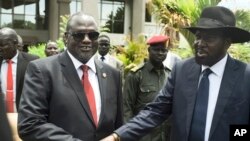The African Union has welcomed the formation of a new transitional government of national unity in South Sudan, calling it a positive step toward peace in the nation.
The formation of the transitional administration is part of the peace accord signed last year by President Salva Kiir and former rebel leader Riek Machar to end a conflict that left tens of thousands dead and many more displaced from their homes.
Erastus Mwencha, deputy chairman of the AU Commission, said high-ranking officials of the continental body were in Juba to help the new government.
“I think it is everybody’s relief that we now see what has gone on for more than two years is behind us, and that we can now concentrate on the institutions and the nation building, but also looking at humanitarian assistance,” Mwencha said.
“We have two of our elder statespersons who are based in Juba," he said. "Former [Botswana] President Festus Mogae and also former [Malian] President Alfa Konare are in constant touch with the government and the people of South Sudan, and part of their terms of reference is to continue to accompany the government to implement the peace accord.”
Tension remains high in some parts of the country despite the formation of the government. South Sudanese groups called on the African Union, the East African Community and the international community to ensure the government implements measures to ease tension and avoid more violence.
Confidence from leadership
Asked how confident the African Union was about the ability of the new administration to ensure peace, Mwencha said it was in the government's interest to resolve citizens' concerns.
“The confidence can only come from the leadership," he said. "And of course, our part is to accompany them, to encourage them" as they address the nation's challenges.
"No one can win the conflict through war," Mwencha added. "You can fight, but eventually, you will end up at the table. So the sooner this can happen, the better it is for the people of South Sudan, because already the people of South Sudan have gone through a lot of suffering.”
Civil society and human rights groups called for the punishment of those found guilty of committing gross human rights violations during the conflict, which lasted more than two years. Mwencha urged the new government to come up with plans to resolve issues that confront citizens following the conflict.
Mwencha said the African Union launched an inquiry into human rights abuses. “The report has been made public, and the next step was to form a hybrid court ... so that that process can move forward to bring this to its logical conclusion,” he said.
“We now need to focus on the key issues, the key elements of institutions and nation building ... and to appeal to the international community, because the tendency has been that once we reach a stage like this, the rest of the international community walks away," he said.
South Sudan needs the international community to provide resources, "because there are a lot of people in the refugee camps [and] there is support needed for institution building," Mwencha said.




